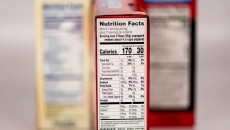FDA petitioned to define 'natural' label claims
Administration (FDA) requesting the establishment of a clear
definition for the use of the term 'natural' on food and beverage
product labels.
The petition claims that the current lack of a formal definition for the term has resulted in misleading claims and consumer confusion.
It requests the adoption of the definition of 'natural' currently used by the US Department of Agriculture (USDA) for meat and poultry products. This states that products can only carry a 'natural' claim if they contain no artificial or synthetic ingredients, and if they are minimally processed.
Indeed, such a ruling would bring significant benefits to the sugar industry, which currently faces stiff competition from artificial and synthetic sweeteners.
The petition also comes at a time when consumer interest in 'natural' and 'organic' products is enjoying steady growth on the back of an increased health awareness.
According to recent studies, "all-natural" is reported as being the most frequent "positive" new product category. In 2004, the National Marketing Institute reported that 63 percent of consumers have a preference for natural foods and beverages. And food sales in natural product stores reached a reported $11.4 billion in 2003.
According to the Iowa State University Agricultural Marketing Resource Center, "the combination natural/organic food category has grown significantly since 1990, increasing four-fold in the decade after and averaging 14 percent annual growth (compared to historic growth rate of 4 percent in the overall food industry)."
"FDA rulemaking on this important consumer consideration for purchasing foods and beverages is not only timely but is necessary to preserve consumer trust as well as safeguard the interests of companies that market natural products," said the Sugar Association.
The petition suggests that a "minimally processed" food ingredient can be claimed as 'natural' only when processing does not affect the natural character of the food or when its molecular structure is identical to that present in the raw material from which it was physically separated.
This would mean that hydrogenation processes for oils and starch-based break down processes for bulking agents and texturizers would no longer be permitted in 'natural' food products.
Furthermore, the petition states that "any product manufactured from a process using extracted enzyme systems designed solely to increase efficiency of specialized molecular degradation remains a chemical process."
And "a substance's mere presence in nature should not be a qualifying factor for a 'natural' claim," it adds.
"When an ingredient or food component is manufactured by extraordinary processing means, the resultant product even if it exists somewhere in nature should not automatically qualify it as natural."
According to the Sugar Association, consumers' lack of knowledge about food ingredients, food technology, food ingredient terminology and marketing claims places them at a disadvantage when trying to evaluate when a product or ingredient is natural.
The association therefore suggests that consumers must rely on the oversight of regulatory agencies to provide food manufacturers with clear and concise regulations.
In 1993, the FDA said it had not included a definition of the term in its Nutrition Labeling and Education Act (NLEA) "because of resource limitations and other agency priorities."
However, it did concede that the use of the term on food labels is "of considerable interest to consumers and industry" adding that "because of the widespread use of this term, and the evidence that consumers regard many uses of this term as noninformative, the agency would consider establishing a definition."













